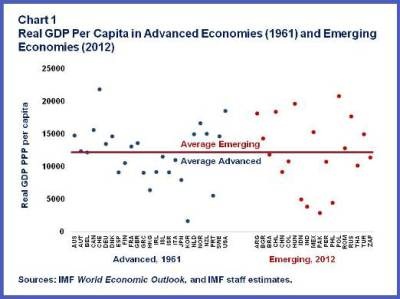Avoiding fiscal fallout in revolutionary times
Recent political and social unrest in some emerging and developing countries may have idiosyncratic features. But they also have a common denominator: a yearning for more equality in incomes, economic self-determination, and political power. Are these developments in seemingly unrelated emerging economies the beginning of a trend?
Simple – some would say simplistic – empirical evidence suggests that this may indeed be the case: look at the convergence of real per capita GDP in emerging markets to the level observed in Western Europe and the United States in the early sixties (see chart 1).
One can conjecture that, once per capita income achieves this level, the rise of the middle class prompts demands for more equity in the distribution of economic and political power. We know the sixties. It was a time when the rise of the middle class led to a wave of social unrest and change that rocked the economy and society – a change that gradually spread throughout the western world (what we now call “advanced economies”), with a call for more social justice, more democracy, and a better life for everyone. What followed were deep social and economic transformations.
Spending surge
What is perhaps less known is that, in most western countries, that call for more social justice and equality was matched, and partly satisfied by, a surge in public spending. Driven by the rise of the welfare state (particularly increased spending for pension and health care), the ratio between public spending and GDP increased by about 20 percentage points between the early 1960s and the early 1980s (essentially stabilising since then, as shown in Chart 2).
Importantly, how was this surge in spending that started in the early 1960s financed? Initially, governments could rely on increased revenues as growth continued to be strong. This lasted until the early 1970s, when deficit financing became the dominant mode, leading – to the extent printing money and inflation were not sufficient – to a surge in the public debt-to-GDP ratio that lasted throughout the early 1990s (Chart 3).
Increases in tax rates – essentially an increased mobilisation of internal resources – contained the eventual rise in deficit and debt. Nevertheless, the trend increase in debt in advanced economies was one of the reasons that limited the possibility of supporting economic activity in the aftermath of the 2008-09 crisis: given the state of public finances, governments had to exit early (some would say prematurely) from the supportive fiscal policy that had initially cushioned the effect of the financial crisis on the economy.
Will history repeat itself?
In principle there is nothing wrong with a surge in public spending and a larger state. In many respects it reflects (changing) societal preferences. But, at a minimum, emerging markets would have to manage the surge carefully. It will not be an easy process as – and that is pretty sure – there will be strong pressure to finance the increased spending through increased debt accumulation. This, in turn, may raise vulnerabilities to an increase in interest rates and reduce the room for fiscal space should economies be hit by unforeseen shocks. In addition, there is a risk that once taxes reach a certain level they distort economic incentives and harm the underlying growth potential. Let’s face it, we do not know what that point is exactly, and it is probably different across countries reflecting various economic and cultural factors. But there is no doubt that many advanced economies now feel the need to scale back public spending and taxation, which are seen as representing a severe constraint on growth.
So, there are many things we do not know and we can only speculate about. But there is at least a distinct possibility that the 2010s will be for emerging economies what the 1960s were for advanced ones: a wonderful decade, but also one that involved major challenges from an economic, social, and (yes) fiscal standpoint.
Carlo Cottarelli is the director of the IMF’s Fiscal Affairs Department.
















